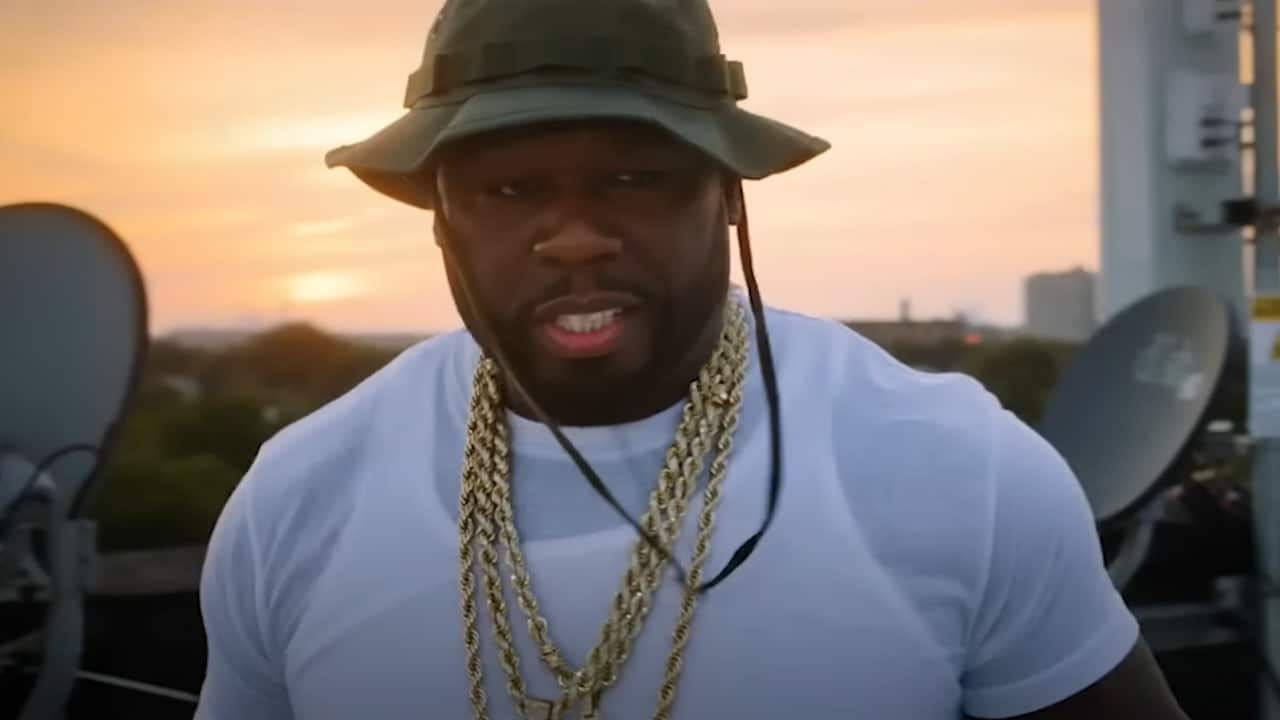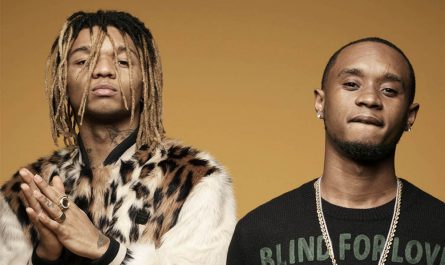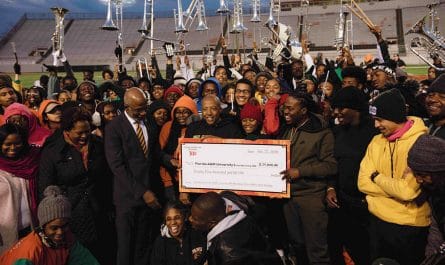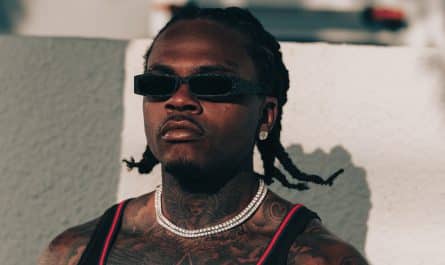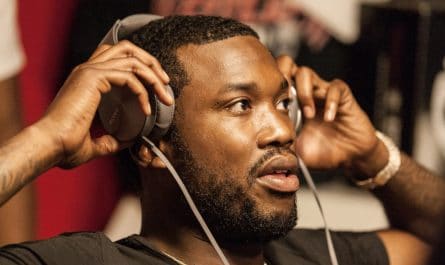Remember back in 2005 when 50 Cent boldly claimed, “I run New York”? Looking at these numbers (1.89 billion streams over the last year), the G-Unit boss wasn’t just talking slick – he was predicting the future.
And it’s not just Queens getting love – from the dirty South to the West Coast, every corner of the map has birthed legends who’ve shaped the game. We’re talking about artists who didn’t just make hits – they built empires, created new sounds, and put their cities on the global map. Whether it’s Atlanta’s trap movement, Houston’s slow and low, or Chicago’s drill scene, each state has contributed its own flavor to the hip-hop gumbo.
They’re cultural architects who took their local sounds and pushed them worldwide. From street corners to corporate boardrooms, they’ve proven that hip-hop isn’t just music – it’s a movement that transforms everything it touches, from fashion to language to business. Let’s break down how these state champions have been cooking up heat in their respective territories…
California:
- Dr. Dre: He revolutionized West Coast hip-hop by creating the G-funk sound that defined a generation and launching careers. His keen ear for talent and production genius led to the discovery of Eminem, 50 Cent, and Kendrick Lamar while building the Aftermath empire.
- 2Pac: His raw emotion and poetic storytelling made him hip-hop’s most influential voice, touching on politics, poverty, and street life with unmatched authenticity. Even after his death, Pac’s legacy lives through 75+ million records sold and countless artists who cite him as their primary influence.
- Kendrick Lamar: Through albums like “good kid, m.A.A.d city” and “To Pimp a Butterfly,” he elevated hip-hop storytelling to new heights while representing Compton’s complexity. His 17 Grammy wins and Pulitzer Prize proves his ability to balance critical acclaim with commercial success while pushing artistic boundaries.
- Snoop Dogg: His smooth flow and laid-back delivery created the blueprint for West Coast rap style, making him Death Row’s breakout star. Beyond music, Snoop’s personality and business ventures have made him a cultural icon who successfully crossed over into mainstream entertainment.
- Ice Cube: As N.W.A’s primary lyricist, he helped birth gangsta rap and brought Los Angeles street stories to the world stage. His solo career proved his versatility as he balanced conscious rap with street narratives while building a successful Hollywood career.
Georgia:
- OutKast: Andre 3000 and Big Boi created a uniquely Southern sound that brought Atlanta hip-hop worldwide recognition through albums like “ATLiens” and “Speakerboxxx/The Love Below.” Their experimental approach and six Grammys proved Southern rap could achieve both critical acclaim and commercial success.
- T.I.: The self-proclaimed “King of the South” pioneered trap music through albums like “Trap Muzik” and “King,” establishing Atlanta’s dominant sound. His Grand Hustle empire and mainstream crossover success helped make Atlanta a hip-hop business hub.
- Young Jeezy: His authentic street narratives and ad-libs influenced trap music’s sound and lyrical content through albums like “Let’s Get It: Thug Motivation 101.” His cocaine rap storytelling style became the blueprint for many Atlanta artists who followed.
- Future: He revolutionized trap music through the innovative use of Auto-Tune and melancholic drug references, creating the “toxic” subgenre. His prolific output and unique vocal style influenced a generation of rappers while maintaining Atlanta’s dominance in hip-hop.
- Ludacris: His witty wordplay and charismatic delivery made him Atlanta’s first mainstream crossover star in the 2000s. Through Disturbing Tha Peace Records and numerous hits, he helped establish Atlanta as a major force in commercial hip-hop.
Florida:
- Rick Ross: His deep voice and luxurious production style redefined Miami’s sound, moving from street tales to boss lifestyle rap. His Maybach Music Group empire helped establish Florida as a major player in modern hip-hop.
- Trick Daddy: He pioneered Miami’s raw street sound in the late ’90s through hits like “Nann” and “Take It To Da House.” His collaboration with Slip-N-Slide Records helped build Florida’s hip-hop infrastructure.
- Kodak Black: Rising from Pompano Beach projects, he brought a unique vocal style and raw storytelling that influenced a new generation of Florida rappers. His stream-of-consciousness delivery and controversial persona made him one of Florida’s most influential modern voices.
- Denzel Curry: The Carol City native revolutionized Florida’s underground scene through his blend of hardcore rap and punk energy. His evolution from Raider Klan member to critically acclaimed artist showed Florida’s artistic range.
- Pitbull: Mr. 305 transformed from a Miami battle rapper to a global pop star while maintaining his Cuban-American identity. His Latin-infused hip-hop created a blueprint for crossover success in the streaming era.
Illinois:
- Kanye West (Ye): He revolutionized hip-hop production and fashion while putting Chicago on the mainstream map through classics like “College Dropout” and “My Beautiful Dark Twisted Fantasy.” His 24 Grammy wins and cultural impact made him Chicago’s most influential artist.
- Common: His conscious lyrics and jazz-influenced sound established Chicago’s alternative hip-hop scene in the ’90s. From “Resurrection” to “Be,” he brought sophisticated wordplay and social commentary to the mainstream.
- Chief Keef: He birthed Chicago’s drill music movement through “Finally Rich” and influenced a generation of rappers worldwide. His raw energy and authentic street perspective changed hip-hop’s sound in the 2010s.
- Lupe Fiasco: His complex lyricism and conceptual albums like “Food & Liquor” proved Chicago could produce sophisticated storytellers. His ability to balance commercial success with intricate narratives influenced modern conscious rap.
- Twista: His rapid-fire delivery style and collaborations with major artists put Chicago’s chopper rap scene on the map. His Guinness World Record for fastest rapper and platinum success showed Chicago’s technical excellence.
Louisiana:
- Lil Wayne: From Cash Money prodigy to “Best Rapper Alive,” he dominated rap through wordplay and relentless work ethic. His impact spans from Hot Boys to Young Money, discovering Nicki Minaj and Drake.
- Master P: Through No Limit Records, he created the blueprint for independent rap success in the South. His business acumen turned New Orleans’ bounce into a national movement.
- Juvenile: His flow and hooks brought New Orleans’ bounce mainstream with “400 Degreez” and “Back That Azz Up.” His authenticity and melodic style influenced Southern rap’s sound.
- Boosie Badazz: Baton Rouge’s street poet brought raw storytelling and emotional depth to Louisiana rap. His influence on trap music and street narratives remains strong despite legal troubles.
- Kevin Gates: Baton Rouge’s modern voice blends melodic rap with street philosophy. His vulnerable lyrics and unique delivery created a new lane for Louisiana artists.
Michigan:
- Eminem: His lyrical genius and raw emotion made him hip-hop’s highest-selling artist while breaking racial barriers in the genre. Through hits like “Lose Yourself” and discovering talent like 50 Cent, he put Detroit on the global stage.
- Big Sean: From Detroit mixtape rapper to mainstream star, he brought the city’s modern sound to a new generation. His clever wordplay and success through G.O.O.D. Music showed Michigan could produce contemporary stars.
- Royce da 5’9″: Detroit’s technical master brought intricate wordplay and authenticity through solo work and Bad Meets Evil. His longevity and respect among lyricists solidified Michigan’s reputation for elite MCing.
Missouri:
- Nelly: He brought St. Louis to the mainstream with “Country Grammar” and unique delivery, selling 21M albums. His crossover appeal and melody-driven style made Missouri hip-hop commercially viable.
- Chingy: His melodic flow and hit “Right Thurr” put St. Louis back in spotlight after Nelly. His success with Disturbing Tha Peace Records proved Missouri wasn’t a one-hit wonder.
- Tech N9ne: Built Strange Music empire from Kansas City, becoming most successful independent rapper. His rapid-fire delivery and rock influences created unique Missouri sound.
- Murphy Lee: St. Lunatics member scored solo success with “Wat Da Hook Gon Be.” His charismatic style complemented Nelly’s mainstream breakthrough.
- J-Kwon: “Tipsy” became a global hit and Missouri club anthem. His energetic delivery influenced mid-2000s party rap.
New York:
- Jay-Z: From Brooklyn street hustler to billionaire mogul, he balanced commercial success with lyrical excellence across classics like “Reasonable Doubt” and “The Blueprint.” His business ventures from Rocafella Records to Tidal showed rappers could become true entrepreneurs.
- Nas: Queensbridge’s finest poet brought intricate storytelling through “Illmatic” and remained relevant for three decades. His complex lyrics and battles with Jay-Z helped drive New York hip-hop forward.
- 50 Cent: His raw energy and marketing genius led to 30M albums sold and major business success through G-Unit. His dominance in the 2000s through “Get Rich or Die Tryin'” revitalized New York’s hardcore sound.
- Rakim: The God MC revolutionized lyricism and internal rhyming through classics with Eric B. His technical innovation influenced generations of New York rappers.
- Biggie: Though his career was cut short, his storytelling ability and smooth flow made “Ready to Die” a blueprint for East Coast rap. His vivid narratives defined New York’s sound.
North Carolina:
- J. Cole: Born in Fayetteville, he became NC’s biggest star through thoughtful lyrics and self-production on classics like “2014 Forest Hills Drive.” His Dreamville Records and festivals put North Carolina on the modern hip-hop map.
- DaBaby: Charlotte’s breakout star brought energetic flow and humor to trap music. His rapid rise through “Baby on Baby” and “Kirk” showed NC could produce mainstream hits.
- Petey Pablo: “Raise Up” became NC’s anthem and put the state on hip-hop’s radar. His raw energy and regional pride influenced southern rap.
- 9th Wonder: Though primarily a producer, his soulful beats with Little Brother and solo work established NC’s sound. His teaching at Duke and NC Central elevated hip-hop education.
- Rapsody: Snow Hill native earned Grammy nominations through conscious lyrics and technical skill. Her storytelling proved NC could produce elite lyricists.
Ohio:
- Bone Thugs-n-Harmony: Their melodic rap style and harmonies revolutionized hip-hop through classics like “E. 1999 Eternal.” Cleveland’s finest brought spirituality and singing to gangsta rap.
- Kid Cudi: Cleveland’s space kid changed rap through melodic humming and emotional depth. His influence on modern rap’s sound and mental health openness is undeniable.
- MGK: Cleveland native crossed from rap to rock while maintaining authenticity. His evolution from battle rapper to genre-bending star showed Ohio’s versatility.
Pennsylvania:
- Meek Mill: Philly’s modern voice brought raw energy through “Dreams and Nightmares” and social justice activism. His intense delivery and legal battles made him the city’s biggest star.
- Lil Uzi Vert: North Philly’s rockstar merged punk and rap while topping charts. His melodic style and fashion influence redefined Pennsylvania hip-hop.
- Beanie Sigel: State Property leader brought street credibility to Philly rap. His work with Roc-A-Fella established Pennsylvania’s gangsta rap scene.
- Black Thought: The Roots’ frontman showcased elite lyricism for decades. His technical skill and longevity proved Philly’s hip-hop excellence.
- Mac Miller: Pittsburgh’s finest evolved from frat rap to artistic innovation. His musical growth and production work influenced a generation.
Texas:
- Travis Scott: From Houston underground to Astroworld, he revolutionized rap shows and psychedelic production. His auto-tuned style and Travis Scott Meal deal showed Texas artists could become global brands.
- Scarface: The Geto Boys legend brought storytelling depth and political commentary to Houston rap. His influence on southern lyricism spans three decades.
- UGK (Bun B & Pimp C): Port Arthur duo pioneered Texas’s sound through “country rap tunes.” Their impact on southern rap’s car culture and slang is immeasurable.
- Paul Wall: Houston’s People’s Champ popularized chopped and screwed nationwide. His grills and car culture brought H-Town lifestyle mainstream.
- Megan Thee Stallion: Houston’s hot girl brought female empowerment and technical skill. Her freestyles and hits proved Texas’s continued relevance.

